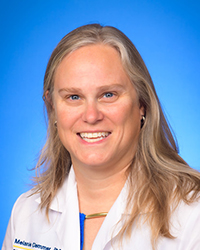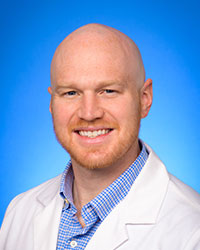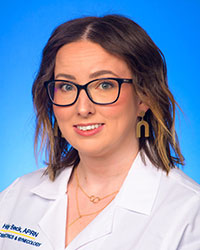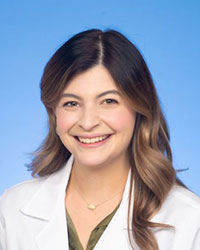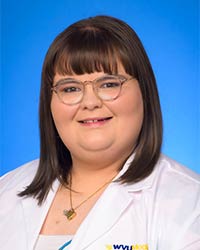About the Center
Established in 2002, the WVU Medicine Center for Reproductive Medicine (CRM) is passionate about providing the highest quality of care to help our patients grow their families. One in eight couples have difficulties getting pregnant or maintaining a pregnancy and we are here to help guide you through this challenging – and occasionally frustrating time. We are delighted to offer a wide range of treatment options for many reproductive medical conditions.
Our location on Pineview Drive offers a private, comfortable experience, while still being close to the J.W. Ruby Memorial Hospital campus and access to many other WVU Medicine specialists. The staff and providers at the Center for Reproductive Medicine are committed to achieving the highest success rates with customized, individual treatment plans, all while providing a compassionate and professional patient experience. We take pride in developing personal relationships with our patients, treating each with the respect and individual attention they deserve.
Conditions and Treatments
Our providers offer you the best in care, comfort, and convenience in our state-of-the-art facility. We involve you in your treatment plans, and can design a therapy that suits your specific needs.
Our services include:
Female reproductive health concerns
- Birth defects of the reproductive tract
- Abnormal pubertal development
- Disorders of ovulation / polycystic ovarian syndrome (PCOS)
- Fibroids
- Endometriosis
- Disorders of the Fallopian tube
- Tubal ligation reversal
- Recurrent pregnancy loss
- LGBTQ family building
- Fertility preservation (for both cancer diagnosis and those wishing to delay childbearing)
- Primary ovarian insufficiency
- Management of menopausal symptoms
Male reproductive health concerns
- Abnormal sperm conditions
- Prior vasectomy
- Erectile dysfunction
- Sperm freeze
- Fertility preservation
Appointments
We feel honored to be able to walk beside you as you start, grow, or complete your family size. The following information is designed to help navigate your initial and follow-up visits with us. At any time, if you don’t feel you understand what is happening, please let a member of our team know and we will make sure you understand and are comfortable with the process.
Please note: The initial consultation and results follow-up visit can be completed in person or via telemedicine video visit.
Initial consultation visit
This visit typically lasts 30 to 60 minutes, and is our chance to get to know you and your partner (as applicable.) Your partner, while highly encouraged, is not required to attend. Your physician will perform a general and reproductive history. They may also recommend an ultrasound and/or bloodwork at this appointment. Fasting for this blood work is usually not required. Your partner may have the opportunity to complete a semen analysis during at this appointment. We recommend between 2 and 4 days of abstinence prior to the test for most accurate results.
If you have questions about the financial aspect of fertility treatments, you will have the opportunity to meet with our financial coordinator at this visit.
To help the physician spend more time discussing our process with you, including your work up and potential treatment, we ask that you fill out the new patient form prior to your visit and bring it with you. If you are unable to fill this out before your appointment, we ask that you check in 30 minutes prior to your appointment time to allow you to fill out this paperwork.
Results follow-up visit
In most situations, there are a handful of tests that will be completed after your initial consultation. Once all the test results are back, you will have a discussion with your physician about the results and will work together with them to develop an individualized treatment plan. Your physician will discuss your treatment options available, the risks and benefits of each, and recommend a treatment plan to optimize your chance at achieving pregnancy.
“Typical” ovulation induction (Clomid or Letrozole) cycle
On the first day of full menstrual flow, referred to as cycle day 1, you will contact the clinic. Please take a urine pregnancy test at home. We will schedule a baseline visit for you between cycle day 3 and 5. If there are no issues with your uterus or ovaries, your physician will order your medications, which you will take for 5 days. You will have an ultrasound scheduled, referred to as a mid-cycle scan, about one week after you begin taking the medication to assess how you responded. At this appointment, your physician will talk you about ovulation (natural versus HCG shot) and timed intercourse, or scheduling for intrauterine insemination (IUI).
IVF cycle
IVF treatment cycles are much more involved than an ovulation induction cycle and your specific appointment schedule will be reviewed with you by your physician and IVF nurse.
Services we offer include:
Ovulation induction (OI) – This treatment involves the female partner taking “fertility” medication to induce egg development. The two most common medication options are Clomiphene Citrate (Clomid) and Letrozole (Femara). Occasionally, injectable hormones are used in combination or alone to assist in this process. Your provider will discuss with you the risks and benefits of these medications and also which is recommended for your specific treatment plan.
Intrauterine Insemination (IUI) – This process, also known as artificial insemination, is designed to get higher numbers of sperm closer to the egg by placing the sperm directly into the uterus. The male partner gives a semen sample, which is then specially prepped in the andrology laboratory. The prepped sperm is then placed into a small catheter which is gently guided through the cervix into the uterus where the sperm are injected.
In-vitro Fertilization (IVF) – In this process, a woman’s eggs are combined with sperm in the laboratory instead of inside the fallopian tube. There are several steps to this process which involves the women taking medication to stimulate multiple eggs to develop. These eggs are then surgically retrieved from the ovary. Fertilized eggs (embryos) are then cultured (allowed to grow and develop) for several days. Embryos are then transferred back into the uterus or cryopreserved (frozen) for later pregnancy attempts.
Intracytoplasmic Sperm Injection (ICSI) – This is a very specific part of the IVF process, where instead of just combining the egg and sperm together, the embryologist injects each egg with a single sperm.
Pre-Implantation Genetic Testing (PGT) of Embryos – Embryos composed of an abnormal number of chromosome (too many too few) will likely cause failed implantation, miscarriage, or lead to birth of a child with a genetic disorder. Embryos with a normal number of chromosomes are call euploid and those with an abnormal number are called aneuploid. There are three genetic testing options available to you:
-
- (1) Preimplantation Genetic Testing for Aneuploidies (PGT-A). Patients with no known genetic defects can use this technique to screen embryos for abnormalities in chromosome number. Since the laboratory doesn’t know of a specific genetic defect, this test looks for missing or extra chromosomes.
- (2) Preimplantation Genetic Testing for Monogenic/Single Gene Defects (PGT-M). This is a more specific test than PGT-A as the laboratory knows a very specific genetic mutation to look for. Since the genetic defect is known, the laboratory will likely develop a specific probe to search for that mutation.
- (3) Preimplantation Genetic Testing for Structural Rearrangement (PGT-SR). Occasionally, male or female patients will have the correct number of chromosomes but sections of chromosomes have traded places. The correct amount of genetic material is present in cells but the location of the material has switch places. This is referred to as a balanced translocation. During reproduction, eggs or sperm can have too much or too little of this genetic material which than causes an unbalanced translocation (aneuploidy) in the embryo.
- Embryos are tested once they reach the blastocyst stage (5-7 days of embryo development). An embryologist will take a few cells from the blastocyst to send for genetic testing. Results typically take around 2 weeks to return. All embryos are cryopreserved while awaiting test results. In a subsequent frozen embryo (FET) cycle, a euploid embryo is thawed and transferred back into the uterus.
Requirements for ART treatments:
- BMI <45 for ovulation induction with or without IUI
- BMI <40 for tubal reversal
- BMI <40 for IVF
- Age <45 for IVF using autologous (your own) eggs – individual circumstances are reviewed for women age 40 and over
- Age <50 for IVF using donor eggs
- Non-smoker (for IVF)
- Lesbian couples must be married (for reciprocal IVF) due to known donor testing requirements
Not all couples are able to use their own gametes (eggs or sperm) for reproduction. Fortunately, the use of donor egg, donor sperm, or donor embryos offers an option for patients to still build their families. The decision to use donor gametes is an extremely personal one, which may evoke a myriad of thoughts and emotions in patients. Our team is here to help guide you through these complex options and make the experience a memorable one.
Donor Egg (oocytes):
Donor egg involves a women undergoing IVF using another woman’s eggs. This option is commonly used by women unable to use their own eggs for conception but still desire and can carry a pregnancy in their uterus. Common reasons for not being able to use your own eggs includes decreased ovarian function due to age, primary ovarian insufficiency (formerly referred to as ‘premature ovarian failure’), or genetic abnormalities. In many cases, donor egg may offer a higher chance or the only of success when compared to use of a woman’s own eggs. The CRM primarily uses Donor Egg Bank USA or World Egg Bank.
Donor Sperm:
For couples with sperm issues, same sex couples, or single women the use of donor sperm is an effective reproductive option. Donor sperm can be used with IUI or IVF treatments.
Donor Embryos:
In some situations, patients may elect to use a donor embryo. With the advancements in IVF success patients are getting pregnant using fewer embryos. This creates a surplus of embryos which are cryopreserved. After completing their family size, it is common for couples’ to donate their embryos for research or to other infertile couples for use. While the child is not genetically the same as the intended parents, women still can have the experience of pregnancy, labor, and delivery.
Reciprocal IVF:
Commonly also referred to as ‘co-maternity’, reciprocal IVF is an option for lesbian couples. With this treatment option, one partner (A) undergoes IVF to retrieve eggs. Embryos are created and transferred back into the uterus of the other partner (B). The child is genetically related to partner A and partner B is biologically connected to the child through the pregnancy.
Success in our mind is a healthy mom and healthy baby at the end of treatment. Given the higher risk associated with multiple gestation pregnancies, our aim is for a healthy singleton pregnancy. Our team will be discussing with you the risks of twins or higher order multiple (triplets, etc.) gestation during your treatment cycles (either ovulation induction +/- IUI or IVF).
Our team will counsel and advise you on the number of embryo(s) to transfer in order to maximize your chance of success while minimizing your risk of multiple gestations (twins, triplets, etc.). We follow guidelines set by the American Society for Reproductive Medicine regarding the number of embryo(s) to transfer.
You can get a detailed look at National and individual clinic IVF success rates by visiting the Society for Assisted Reproductive Technology (SART). You can see the CRMs reported success rates by clicking here.
Disclaimer: A comparison of clinic success rates may not be meaningful because patient medical characteristics, treatment approaches, and entry criteria for ART may vary from clinic to clinic.
SART also provides an IVF prediction calculator to help patients see their chance of live birth after one, two, or three cycles of IVF. Your physician will gladly discuss with you your individual circumstance and chance of success. Please visit www.sart.org and look under the IVF success tab.
Patient Testimonials
We are very privileged to walk through this journey with you and feel blessed with each success. Below are anonymous testimonials from our patients.
“I honestly could not have asked for a better group of staff to help us start/complete our family.”
“The staff are all wonderful! They always answer my questions with as much info as possible and make sure I understand.”
“The staff is the best. They treat you like family.”
“They are such great people! They made me and my husband feel at home.”
“Everyone I am around has been nothing but supportive. This stuff is tough to deal with but it makes it easier knowing you are in good hands.”
“I love how positive and upbeat everyone is – this is a difficult process and having support and a positive team is incredibly helpful. We are so grateful for you all.”
Genetic Testing and Counseling
With advancements in technology we are now able to screen for genetic conditions that individuals or couples may carry. Genetic testing can be done if there is a specific known genetic mutation that runs in the family or can be done as a general screening test.
Patients with a known genetic mutation can utilize IVF with Preimplantation Genetic Testing for Monogenic/Single Gene Defects (PGT-M) to screen embryos for the presence or absence of the specific genetic mutation.
Genetic carrier screening involves testing your blood to see if you “carry” recessive gene changes (mutations) that can be passed down to offspring. “Carriers” of a recessive gene mutation only have one copy of a gene mutation. In order to develop a recessive genetic condition, one must have two copies of the gene mutation – one from the biological mother and one from the biological father. If you are a carrier for a disorder and your reproductive partner is a carrier for the same disorder, each offspring has a 25% chance to have the genetic condition.
The American College of Obstetrics and Gynecology (ACOG) and the American College of Medical Genetics (ACMG) recommend that all patients be offered carrier screening for a small panel of genetic disorders. These include cystic fibrosis (CF), spinal muscular atrophy (SMA), and others depending on your ancestry. We also offer an expanded carrier screening option which evaluates at 283 genetic disorders.
Your provider will discuss genetic screening options with you at the initial consult appointment or at any time in the future as requested. All genetic screening is optional and we encourage our patients to ask questions to make sure they are making an informed decision to either opt for or against testing. The CRM has access to genetic counselors through the contracted screening laboratories and also through the Ob/Gyn Department to help discuss your results with you as needed.
Nutrition Counseling
Our goal at the end of the infertility treatment journey is to have a healthy mom, healthy pregnancy, and healthy baby. Currently the clinic has BMI restrictions for both general infertility treatment and IVF. We require a BMI <45 for general infertility treatment and <40 for IVF. We know weight and weight loss is a sensitive subject and we strive to work together with you on this process. Our registered dietician, Helenia Sodoski works closely with our patients to assist them with their desired nutritional and weight loss goals. If surgical treatment or bariatric surgery, is indicated then we can refer you to the appropriate providers.
Obesity is the most common chronic disease in the United States and has increased dramatically over the past two decades. Almost 67% of women and 75% of men are overweight (BMI 26-29) or obese (BMI ≥30), as are nearly 50% of women of reproductive age. In addition to increased general health risks discussed below, obesity is frequently associated with menstrual cycle disturbances. Overweight or obese women have a longer time to conception.
The probability of conception declines by 4% per kg/m2 in women with BMI >29 kg/m2. It has been observed that the time to pregnancy is increased to >12 months when both partners are obese. Obesity has been associated with longer duration and increased amounts of gonadotropin stimulation with an increased frequency of cycle cancellation for inadequate response. Obesity in men can also have an adverse effect on semen/sperm parameters. In obese men, the scrotum remains closer to the surrounding tissue, predisposing to increased scrotal temperatures that may adversely affect semen parameters.
Obesity not only affects the ability to get pregnant but also the pregnancy and delivery process too. Obesity is strongly associated with pregnancy and perinatal complications, including gestational diabetes and hypertension, pre-eclampsia, preterm delivery, stillbirth, cesarean or instrumental delivery, shoulder dystocia, fetal distress, early neonatal death, small and large-for gestational age infants. Obese women who conceive via IVF are also at increased risk for pre-eclampsia, gestational diabetes, preterm delivery, and cesarean section.
Obesity has profound general medical complications outside of reproduction. Obesity causes or contributes to a large number of health problems including type II diabetes, hypertension, coronary heart disease, dyslipidemia, respiratory dysfunction, sleep apnea, osteoarthritis, urinary incontinence, and increases in breast, endometrial, ovarian and colon cancers.
Reproductive Urology
Male factor infertility, either alone or in combination with female factors, is a common cause of infertility. Our providers evaluate and treat conditions associated with abnormal sperm conditions, erectile dysfunction, prior vasectomy, sperm freeze, and fertility preservation.
Social Work and Grief Support
It is not uncommon for individuals and couples to struggle dealing with their infertility and treatments. Even after getting pregnant couple can experience miscarriage or recurrent miscarriages. The process may be long and taxing from emotional, physical, financial, and relationship standpoints. We, at the CRM, want you to know that you don’t have to go through it alone. Our team is dedicated to helping patients navigate through the difficult times.
While insurance coverage for infertility is expanding and improving, most insurance plans cover little or none of the costs associated with treatments. Below are some of the financial costs* for different tests or procedures if you are paying out of pocket.
*Costs are current as of 08/28/2024, but subject to change without notice. All prices below do not include the cost of medication or anesthesia cost.
Initial consultation: $372 – $468
Genetic Carrier Screening: $250- $350
Results follow up: $170 – $244
Midcycle monitoring appointment and ultrasound: $603
IUI: $367 – $422
Sonohysterogram with or without tubal assessment: $1,193
IVF with Fresh Transfer: $12,779
IVF + ICSI with Fresh Transfer: $15,179
IVF with Freeze all: $12,195
IVF + ICSI with Genetic Testing: $15,695 (plus genetic testing cost)
Frozen Embryo Transfer: $4,164 – $5,357
Locations
WVU Medicine Center for Reproductive Medicine
1322 Pineview Dr.
Morgantown, WV 26505
Phone: 304-598-3100
Fax: 304-598- 8301
From I-79:
Take exit 155 toward Star City and WVU. Turn onto Chaplin Road. Continue onto US-19 S / Monongahela BLVD. Turn left onto Patteson Drive. Continue onto Van Voorhis Road. Turn right onto WV-705 E / Chestnut Ridge Road. Turn left onto Pineview Dr. Stay left on Pineview Dr. Clinic will be on the right.
From I-68 and WV-705:
Take exit 7 toward WV-705. Merge onto Cheat Road. Continue onto US-119 / Mileground Road. At the traffic circle, take the 2nd exit onto WV-705. Turn right onto Pineview Dr. Stay left on Pineview Dr. Clinic will be on the right
WVU Medicine Center for Reproductive Medicine at Uniontown
205 Mary Higginson Lane
Uniontown PA 15401
Follow the WVU Center for Reproductive Medicine on Facebook.
Navigating through the infertility process can be overwhelming and frustrating. Below are some recommended websites and resources to aid in the process.
General Infertility Resources
American Society for Reproductive Medicine (ASRM)
Society for Assisted Reproductive Technologies (SART)
Resolve: the National Infertility Association
American College of Obstetricians and Gynecologists (ACOG)
Fertility Preservation
Alliance for Fertility Preservation
Memorial Sloan Kettering Cancer Center
Grants and Assistance Programs
There are several organizations and foundations that offer fertility grants, or financial assistance.
